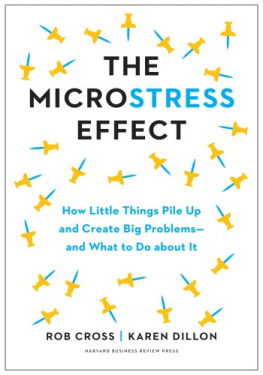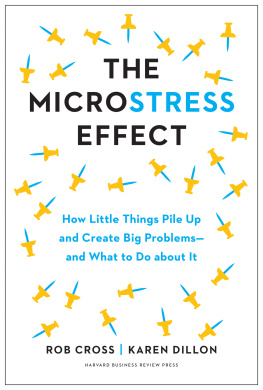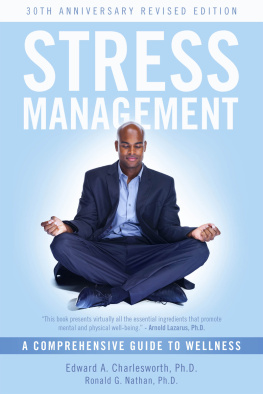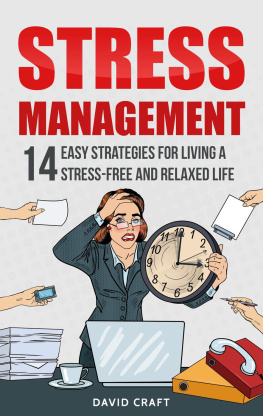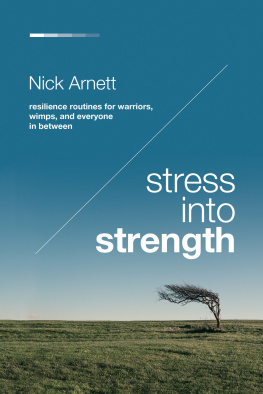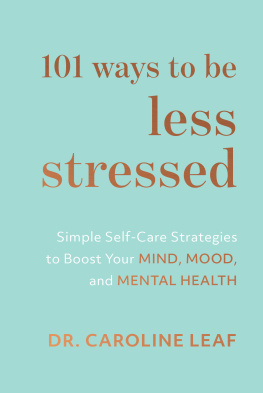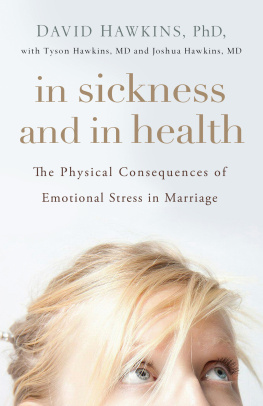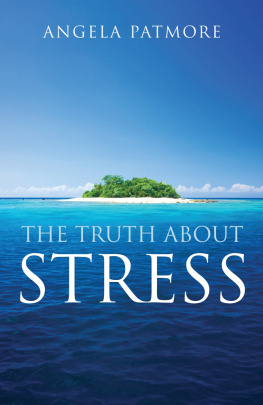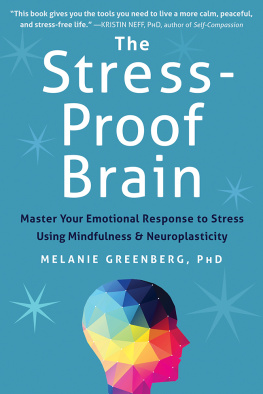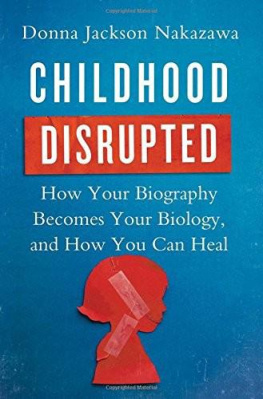The Microstress Effect is a revelation. Cross and Dillon offer practical and sensible strategies for regaining control of your time and your well-being, drawn from years of academic research. If small hassles and burdens are infecting your life, this remarkable book is the antidote.
DANIEL H. PINK, #1 New York Times bestselling author, The Power of Regret , Drive , and When
Cross and Dillon provide fresh insight into one of the most important topics of our timewhy so many high performers are at risk of burnout in both their careers and their lives. Based on solid academic research, The Microstress Effect offers not only hope but also practical guidance for fending off microstress and living a rich, fulfilling life.
SUSAN DAVID, #1 Wall Street Journal bestselling author, Emotional Agility
With stories that everyone can relate to, easy-to-use self-assessments, and practical coaching breaks, the authors offer us real hope that we can create a happier and healthier life for ourselves and those around us. This book should be required reading for corporate leaders and individuals alike! I will be giving it to the people I care most about.
JACQUELINE WILLIAMS-ROLL, Chief Human Resources Officer, General Mills
I read this brilliant book and said Yup, yup, yup over and over again. Cross and Dillon put the experiences of high performers into words. Microstresses exist and cause inordinate social, emotional, and physical risk. Following their astute insights, readers will recognize their stresses and how to overcome them. Nothing could be more meaningful in this emotionally demanding time.
DAVE ULRICH, Rensis Likert Collegiate Professor of Business Administration, Ross School of Business, University of Michigan; Partner, The RBL Group
Timely, practical, credible, and timeless, with more practical tips for lowering my stress levels than anything Ive read in years, The Microstress Effect is a game changer. I read it in one sitting and need the people around me to read itnow!
TOM RATH, bestselling author, StrengthsFinder 2.0 and Lifes Great Question
Cross and Dillon shed light on the unexpected ripple effect of our daily interactions and relationships, clarifying the critical nature of human connections in this important new book. Introducing microstress as new form of stress, they also provide practical steps for fighting back. Everyone can benefit from reading this book.
AMY EDMONDSON, Novartis Professor of Leadership and Management, Harvard Business School; author, The Fearless Organization
The Microstress Effect gives fresh, actionable advice to fight back, take control, and live a richer life each day.
DORIE CLARK, Wall Street Journal bestselling author, The Long Game ; faculty member, Executive Education, Duke University Fuqua School of Business
With so much attention being paid to individual well-being, its astounding that so little consideration has been given to the day-to-day microstress every one of us endures. Thank goodness for Rob Cross and Karen Dillon. In The Microstress Effect they help us recognize this invisible epidemic and leverage research to help us remove microstress so we can live healthier and happier lives.
KEVIN OAKES, CEO, Institute for Corporate Productivity (i4cp)
This is an enlightening work on a new, insidious, and invisible form of stress that is derailing even the most high-performing employees. But the authors offer solutions as well. This book should be required reading for business leaders in organizations of all sizes.
JOHN BOUDREAU, Emeritus Professor of Management and Organization, Emeritus, and Research Director, Center for Effective Organizations, Marshall School of Business, University of Southern California
Cross and Dillon have done a masterful job of flipping our thinking. Their identification of microstressors that sits below our perceptual threshold is uniquely powerful. Just as powerful is the idea that the sheer number of necessary connections we must have today can be reframed and redirected to create resilience rather than spiraling down into collaborative and connective overload. A postpandemic must-read for business leaders.
DENNIS BALTZLEY, Senior Partner and Global Head of Leadership Development, Korn Ferry
The Microstress Effect makes a compelling case that, for most of us, its the cumulative impact of one little problem after another that can ruin our lives. Rob Cross and Karen Dillon pack this lively gem with practical and proven solutions. It will help you eliminate pesky microstressors, suffer less from your remaining troubles, andby taking joy in the lovely little momentstravel through your days with a zest for life.
ROBERT I. SUTTON, Professor of Organizational Behavior, Stanford Graduate School of Business; bestselling author, The No Asshole Rule, Good Boss, Bad Boss ; and coauthor (with Huggy Rao), Scaling Up Excellence
Powerful! The Microstress Effect gives you the actionable steps you need to take control of your life and create a balance in your work that leaves you feeling fulfilled. A must-read for anyone feeling stuck in a cycle of stress and hurry!
MARSHALL GOLDSMITH, Thinkers50 #1 Executive Coach; New York Times bestselling author (with Mark Reiter), The Earned Life, Triggers , and What Got You Here Wont Get You There
Chock full of practical tools, this empowering guide reminds us of the critical importance of relationships and shows us how to meaningfully cultivate them in our everyday choices.
STEW FRIEDMAN, Practice Professor of Management, Emeritus, The Wharton School of Business; author, Total Leadership
The Microstress Effect is a real eye-opener and will forever change the way I look at stress. I absolutely recommend it for anyone who wants to regain their energy, focus on what truly matters, and live a life fully in alignment with their core values.
FRIEDERIKE FABRITIUS, Wall Street Journal bestselling author, The Brain-Friendly Workplace HBR Press Quantity Sales Discounts Harvard Business Review Press titles are available at significant quantity discounts when purchased in bulk for client gifts, sales promotions, and premiums. Special editions, including books with corporate logos, customized covers, and letters from the company or CEO printed in the front matter, as well as excerpts of existing books, can also be created in large quantities for special needs.For details and discount information for both print and ebook formats, contact .
Copyright 2023 Rob Cross and Karen Dillon
All rights reserved
No part of this publication may be reproduced, stored in or introduced into a retrieval system, or transmitted, in any form, or by any means (electronic, mechanical, photocopying, recording, or otherwise), without the prior permission of the publisher. Requests for permission should be directed to , or mailed to Permissions, Harvard Business School Publishing, 60 Harvard Way, Boston, Massachusetts 02163.
First eBook Edition: Apr 2023
ISBN: 978-1-64782-397-9
eISBN: 978-1-64782-398-6
To our kids: Rachel and Connor and Rebecca and Emma, who are a constant source of joy and a continual reminder of the importance of being truly present with the people we care most about.
CONTENTS
INTRODUCTION
Invisible and Relentless
W e didnt set out to write this book. For the past two decades, I (Rob Cross) have been studying the underlying network dynamics of effective organizations and the collaborative practices of high performers. Ive written extensively about how certain people can work far more productively than others because of how they tap their network of connections. Ive tried to identify the flawed assumptions that are often baked into the corporate understanding of who their most valuable employees are and how these people leverage networks to produce results.
But in doing a series of interviews with high achievers about the practices that allow them to be effective collaborators, I stumbled onto something bigger. In one of my first interviews, I heard a wonderful story about the role that connections with others played in helping a life sciences executive shift to a healthier lifestyle after a stern warning from her doctor. She went from being a self-described sedentary workaholic to a person who actively chose vacation destinations where she and her husband could run marathons together. When we spoke, her energy was off the charts, and she was clearly in a great place in her life. Because my interviews were focused on people who had been identified as high performers by their organizations, it made sense that Id speak with a marathon runner or two. But as she was enthusiastically sharing her new lifestyle with me, I wondered something different. How had someone who was clearly goal-driven neglected her own well-being so drastically? On a whim I asked her what had thrown her so off track in the first place. For a moment, she was stumped. It was just life, I guess, she told me.
Next page
